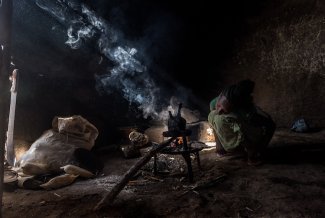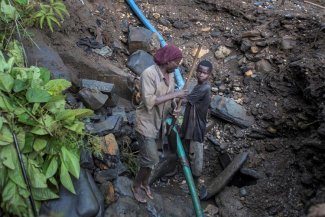Faced with extreme poverty, many Afghan children work to support their families. According to the International Labour Organization (ILO), around 29 per cent of Afghan children between the ages of five and 17 were engaged in child labour in 2018. Although prohibited by local and international law, child labour has been a common reality in the country for many years. Due to lacking resources and endemic corruption, public authorities have been unable to curb the phenomenon.
As a result of the Taliban’s takeover on 15 August 2021 and the violent humanitarian crisis that has been raging ever since, more and more Afghan children are being forced to work. For their report for Equal Times, journalist Inès Gil and photojournalist Florient Zwein met with children on the streets of Kabul in November 2021.
This photo report is accompanied by a full article on child labour in Afghanistan that can be read here:

Ahmad Zia, 10, walks the streets of Dasht-e-Barchi, a neighbourhood located in western Kabul, with a metal box filled with a dried herb called spand. For 10 afghanis (approximately US$0.10), Zia lights the herbs on fire and stirs the box, from which black smoke arises. The practice is said to bring good luck to the customer.
Ahmad Zia has been working as a ‘fire turner’ for a year. He says that he still attends school and that he works by his own choice: “I have two brothers and four sisters but some of them are ill and can’t work. I earn a little money to feed my family.”

Omid sells birds at a market in Kabul for 70 afghanis (approximately US$0.75), earning up to 500 afghanis (around US$5.30) a day. “I’m ten years old. I started working when I was two,” he says.
Most of the children working outside of their homes are boys. Omid, 10, walks through the commotion and general euphoria of Kabul’s bird market carrying several budgies in a cage. Omid sells birds out of necessity, but unlike most working children, he also happens to enjoy it: “I do it to help my family because times are hard. But I also earn pocket money. I go to school and from time to time I come to the market. I like this work.”

Mashal, 12, sells pomegranate seeds in the streets of Sharenaw in southern Kabul. He started working in October 2021 as Afghanistan’s economic situation was deteriorating by the week.
Mashal winds through the throngs of shoppers on the commercial streets of Sharenaw holding a tray of a dozen or so cups of pomegranate seeds, a popular fruit in Afghanistan. He sells them for 10 afghanis and earns 200 afghanis a day (approximately US$2.10). “Because of the crisis, we have no money left at home. I have a sister and a brother who are younger. My father is old and can’t work any more. I’m the oldest son, so it’s up to me to take care of the family.”

Hekmat, 11, runs a stand at a Kabul market selling various items, such as lighters and pens. He dropped out of school so he could work with his father.
Work forces some children to drop out of school. Hekmat’s small figure barely protrudes from between two stalls at Kabul’s Pul-Khashti market. He is still very young and vulnerable: “People passing by have stolen things from me several times. I can’t defend myself.” Hekmat, who has three sisters and a brother, started working a year ago. “My father and I are the only ones who work. I earn 400 afghanis (US$4.20) a day. We’re getting by for now but we fear for the coming months.”

Ahmad resells US army food portions salvaged from abandoned military bases to help his family. He earns about 200 afghanis a day, which is not enough to support his family of six.
Often responsible for feeding their families, elder boys often have to start working early. Ahmad stands behind a small stand at the Pul-Khashti market. As he is 15 years old, Afghan law allows him to work under certain conditions. But he has been doing this work for seven years already: “I live with my mother and four sisters. My father died and I’m the only one who supports my family.” He also attends school and has two years to go before he can study in higher education. “I don’t know yet if I will be able to go to university. It all depends on the economic situation.”

Forced to work by her family, young Hosna has been shining shoes in the Dasht-e-Barchi district in western Kabul for the last three years. She doesn’t know her age but could be seven or eight. She lives in Kabul with her parents and 10 brothers and sisters.
According to an April 2021 report by the National Statistics and Information Authority (NSIA), twice as many boys as girls work in jobs outside of the home. However, it is not uncommon to see girls working in activities such as begging, selling goods, or shining shoes.
Hosna, a young girl with braided hair and bright eyes, sits atop a bridge over the Paghman River in the Dasht-e-Barchi district shining shoes for a few afghanis. “With the money I earn, I bring home five loaves of bread a day. When we can, we try to eat something else. But over the last few months we’ve sometimes had to skip meals.” In 2021, she started attending a local public school. “I prefer to study. It’s difficult, I’m too small to work.”

Muzghan, 9, has been working as a water carrier in the Karte Sakhi cemetery for over a year. She earns 10 Afghanis for each grave cleaned. Back home, she also has to work doing household chores. According to the NSIA, half of all Afghan girls are actively working in their households.
Child labour is often hard and dangerous. Dressed in a brown veil and modest clothes, a small figure wanders between the graves in the Shia cemetery of Karte Sakhi carrying two heavy pots of water. In the Shia tradition, the families of the deceased clean the graves of their loved ones.
Muzghan is also going to school and would like to become “a painter or a doctor”. But in the Taliban’s Afghanistan, she cannot continue her studies beyond the sixth grade, the equivalent of high school.















